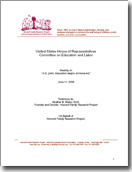The Harvard Family Research Project separated from the Harvard Graduate School of Education to become the Global Family Research Project as of January 1, 2017. It is no longer affiliated with Harvard University.
HFRP Director Testifies Before House Committee on Education and Labor
June 25, 2008

Dr. Heather Weiss, Founder and Director of Harvard Family Research Project, was one of five witnesses to testify before the U.S. House of Representatives Committee on Education and Labor at the June 11 hearing on House Resolution 243, Education Begins at Home Act" (EBAH). This bipartisan legislation would create a federal funding framework to help states develop, deliver, and evaluate home visitation as a core component of early childhood services.
Home visitation programs provide parenting education and support to families of young children. The EBAH bill would support home visitation services from birth until kindergarten for a variety of populations, including military families and families with limited English proficiency.
The Committee hearing, chaired by U.S. Representative George Miller (D-CA), examined EBAH, which would authorize $500 million in grants over 3 years. The bill would help states create partnerships between home visitation programs and community organizations to coordinate the delivery of services from a range of child-serving programs.
Weiss testified as an expert in family involvement in support of the bill. “Forty years of research shows that parenting and family processes are one of—if not the—strongest predictors of child development and school and life success,” she said. “[Families are] therefore very powerful sources of improving outcomes for kids.” She noted that home visitation programs can increase school readiness and parents’ understanding of their role in child development, strengthen parenting practices, improve maternal and child health, and help to reduce child maltreatment.
The benefits of early childhood home visitation do not stop when the child enters school. Home visits set a pattern of parent involvement that continues through the school years.
“When you create that pathway,” Weiss said, “you increase the likelihood of the long-term benefits that we want for kids: high school graduation with the skills they need to succeed in college or postsecondary education, and then in a global economy."
Weiss emphasized drawing on existing research about developing high-quality home visitation programs to make EBAH programs successful. Critical elements include training, supervision, curriculum, and using data to track performance. “The legislation,” “makes provision for all these indicators of quality,” Weiss noted.
In his summation, Chairman Miller agreed that this research would be essential to EBAH programs’ success. “[Dr. Weiss makes] it very clear that, where the quality indicators aren’t in place, we’re just kidding ourselves,” he said. He noted that creating adequate provisions to collect data and use it for continuous improvement could create a bright future for home visitation. “We could be back here 5 to 10 years from now and see a program that has continued to improve without us creating a lot of regulations and hurdles.”
Additional information about HFRP and family involvement
Weiss and her colleagues at HFRP are known for their work building the research base for family involvement as an important part of complementary learning. Complementary learning is the idea that a systemic approach—which intentionally integrates both school and nonschool supports—can better ensure that all children have the skills they need to succeed.
Many themes Weiss discusses in her testimony are covered in the most recent issue of HFRP’s periodical The Evaluation Exchange. The issue, which focuses on Building the Future of Family Involvement, examines the current state of and future directions for family involvement in research, policy, and practice.
